|
|
|
Sort Order |
|
|
|
Items / Page
|
|
|
|
|
|
|
| Srl | Item |
| 1 |
ID:
171330
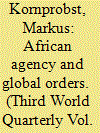

|
|
|
|
|
| Summary/Abstract |
How much agency do African states have to shape global orders? This study puts the global nuclear order under scrutiny to answer this question. It amounts to a demanding case. Arms control is something that global great powers take very seriously, and there is no weapons category that they take more seriously than nuclear weapons. My findings provide a nuanced picture. Although often outflanked and frustrated by nuclear weapon states, the nuclear order would look different without African actors exerting their agency. They successfully shaped background and foreground institutions constituting the global nuclear order by building advocacies for new institutions upon already existing ones, reaching out to state and non-state actors outside of Africa, and channelling communication through African states with authority in global fora. This study makes three contributions: First, it underlines the key finding of recent literature on African agency that African actors are more to be reckoned with than often assumed. Second, it provides novel evidence about the diplomatic mechanisms through which they come to make a difference. Third, it adds to our grasp of the constitution of global orders as well as the processes through which they come to be made, re-made and unmade more generally.
|
|
|
|
|
|
|
|
|
|
|
|
|
|
|
|
| 2 |
ID:
077293
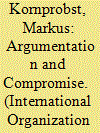

|
|
|
|
|
| Publication |
2007.
|
| Summary/Abstract |
How do states come to select norms? I contend that, given a number of conditions are present, states select norms in three ideal-typical stages: innovative argumentation, persuasive argumentation, and compromise. This norm selection mechanism departs from the existing literature in two important ways. First, my research elaborates on the literature on advocacy networks. I explain why agents engage in an advocacy for a normative idea in the first place; I add the epistemic dimension of reasoning to argumentation theory; and I show in detail the pathways through which persuasive argumentation links an advocated idea and already-established sets of meaning. Second, synthesizing rationalist and constructivist selection mechanisms, I contend that successful argumentation makes recalcitrant actors eager to reach a compromise with the advocates as long as this does not violate their most cherished beliefs. The Republic of Ireland's eventual selection of the territorial status quo norm in the late 1990s lends empirical evidence to this norm selection mechanism
|
|
|
|
|
|
|
|
|
|
|
|
|
|
|
|
| 3 |
ID:
079903


|
|
|
|
|
| Publication |
2007.
|
| Summary/Abstract |
Irredentism developed into an anomaly in post-World War II Europe and - contradicting the dire predictions of the 1990s - has remained an anomaly even since the end of the Cold War. Focusing on the renunciation of the FRG's and the Republic of Ireland's irredentist claims, I propose a novel route to analyse dispute settlement. I contend that nations justify their stance in a conflict. In the case of irredentism, they do not merely assert that a disputed territory is their land but justify to themselves and others why the disputed territory is rightfully theirs and why pursuing the irredentist stance is worthwhile. The disruption of this justification - what I call dejustification - constitutes a pathway to dispute settlement. Dejustification occurs through a change of the ideational environment that serves as the resource for justifying the claim and an advocacy that constructs a mismatch between environment and claim
|
|
|
|
|
|
|
|
|
|
|
|
|
|
|
|
| 4 |
ID:
064637
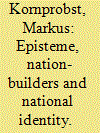

|
|
|
| 5 |
ID:
180376
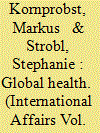

|
|
|
|
|
| Summary/Abstract |
Do global health institutions keep up with globalization forces? We contend that they seriously lag behind. While medical knowledge becomes more and more refined in showing how diseases spread globally, the political order meant to address this problem is barely global. It is global in terms of the promises it makes in declarations and even legally binding instruments (institutional foreground). But many entrenched political practices of interaction do not keep these promises (institutional background). We explain this with the dominance of a traditional diplomatic ‘feel of the game’ in which often narrowly defined national interests, positioning battles among states, and a subordination of global health under considerations of international security and economics prevail. Based on this diagnosis, we discuss three scenarios for the further evolution of the global health order: (1) the persistence of current institutions, (2) revisions of the institutional foreground and persistence of the background, and (3) a qualitative break that makes amendments to both. While the COVID-19 crisis provides openings for the third and, even more so, the second one, the current upheavals in the liberal constellation of orders makes the first scenario the most likely one.
|
|
|
|
|
|
|
|
|
|
|
|
|
|
|
|
| 6 |
ID:
180363
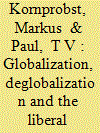

|
|
|
|
|
| Summary/Abstract |
For decades, globalization and the liberal international order evolved side by side. Recently, however, deglobalizing forces have been on the rise and the liberal international order has come to be increasingly beleaguered. The special issue ‘Deglobalization? The future of the liberal international order’ examines the interconnectedness of globalization and deglobalization processes on the one hand and the trajectory of the liberal international order on the other. This introduction provides a conceptual frame for the articles to follow. It discusses globalization and deglobalization processes, compares how they have been intertwined with the liberal international order in the past and presently, and explores how these differences are likely to affect the future of world politics. The special issue makes three important contributions. First, we examine globalization and deglobalization processes systematically. Second, we break new ground in studying the future of international order. Third, we generate novel insights into epochal change.
|
|
|
|
|
|
|
|
|
|
|
|
|
|
|
|
| 7 |
ID:
114808
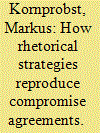

|
|
|
|
|
| Publication |
2012.
|
| Summary/Abstract |
How do actors, once they have reached agreement on a compromise, make this compromise persist? Being rooted in mutual concessions, it can never be taken for granted that compromises, once agreed upon, stay in place. Contestation about compliance is something that is very much to be expected and does not inevitably destabilize a compromise. Whether such a destabilization occurs or not depends on how actors communicate with one another. I contend that whether compromise persists or not has a great deal to do with the interplay of offensive and defensive rhetorical strategies that actors employ. I identify six offensive strategies (recourse, elaboration, entrapment, accusation, ostracism, abandonment) and six defensive ones (accommodation, placation, denial, deflection, inattentiveness, rejection), and chart the degrees to which offensive-defensive exchanges of strategies are conducive to reproducing compromises. Recourse-accommodation interplays on the one hand (most conducive) and abandonment-rejection interplays on the other (least conducive) form the poles of the spectrum of exchanges. I probe my theoretical framework by inquiring into the stability of the grand compromise that underpins the nuclear non-proliferation regime. The findings support my framework. The parties have tended to stay away from heavy rhetorical artillery and stuck to less robust rhetorical strategies. Elaboration and placation strategies have played a particularly important role for making the grand compromise persist.
|
|
|
|
|
|
|
|
|
|
|
|
|
|
|
|
| 8 |
ID:
087339
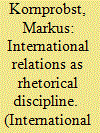

|
|
|
|
|
| Publication |
2009.
|
| Summary/Abstract |
International Relations takes it all too often for granted that different scholarly sub-communities in the field are incommensurable and, therefore, that the erosion of the community of International Relations scholars is inevitable. I present a three-fold argument against this inevitability: First, International Relations is much better understood as a field of overlapping horizons than a discipline of incommensurable paradigms. Second, the most consequential overlap is epistemological. This overlap is constituted by very specific rhetorical understandings of epistemology that come remarkably close to the Aristotelian Rhetoric and Philosophical Sophistic. International Relations is a rhetorical discipline. Third, dialogue is able to seize the opportunities for communication across different horizons within and beyond International Relations-making it a lively and open discipline instead of a constellation of hermetically sealed and self-referential sub-communities.
|
|
|
|
|
|
|
|
|
|
|
|
|
|
|
|
| 9 |
ID:
114805
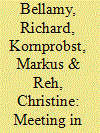

|
|
|
|
|
| Publication |
2012.
|
| Summary/Abstract |
Compromise is routinely evoked in everyday language and in scholarly debates across the social sciences. Yet, it has been subjected to relatively little systematic study. The introduction to this inter-disciplinary volume addresses the research gap in three steps. First, we offer three reasons for the study of compromise: its empirical omnipresence in politics, its theoretical potential to bridge the rationalist-constructivist divide, and its normative promise to recognize the plurality of society. Second, we introduce different approaches to the coherence, legitimacy and limits of compromise found in the existing explanatory and normative literatures. We discuss why these literatures need to speak to one another, and identify possible applications in empirical research. Third, we conceptualize compromise as one possible solution to a conflict. Distinct from both dissensus and consensus, all compromises share three characteristics: concessions, non-coercion and continued controversy. However, different types of compromise can be distinguished by how mutual, costly and painful concessions are; by whether all forms of coercion are absent; and by the degree to which the relevant parties' grounds for conflict are transformed. We conclude by discussing the challenge and appeal of 'politics as compromise' in plural and complex societies.
|
|
|
|
|
|
|
|
|
|
|
|
|
|
|
|
|
|
|
|
|